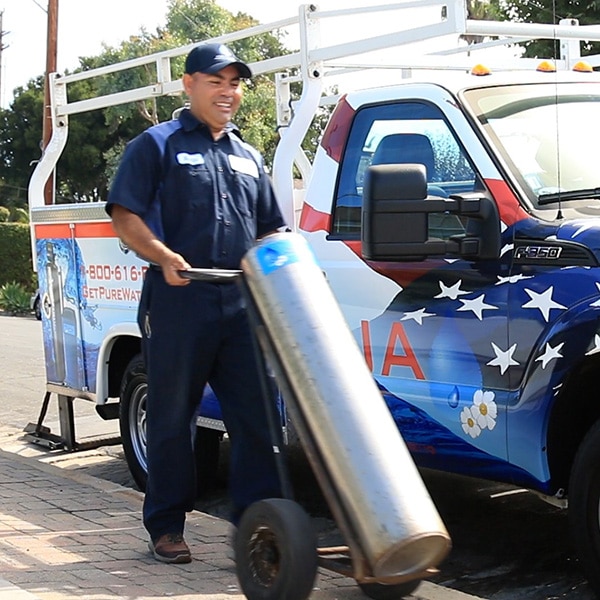Traditional Versus Salt-Free Water Softeners
Traditional Water Softener
A traditional water softener, also called an ion-exchange water softening system, removes calcium and magnesium. It uses negatively charged resin beads to attract and trap positively charged hardness minerals. When those beads have been worn out by their work, they go through a process called “regeneration,” where they’re rinsed with a specialized sodium solution. That’s why salt is a vital ingredient for a water softener as it helps keep the system working effectively.
Keep in mind that this salt doesn’t interact with your tap or drinking water, so it doesn’t add sodium levels to your diet. Instead, it’s flushed into the sewer or septic system.
Salt-Free Water Softener
A salt-free water softener isn’t a softener at all. More accurately it is best described as a salt-free water conditioner.
Water softening occurs when hardness minerals are removed, however, salt-free systems don’t technically remove anything. Instead, they change the chemical structure of the minerals so they’re less adhesive. That means calcium and magnesium will still be present in your water, but won’t be as troublesome as before. The result is you will enjoy better but not softened water.
A salt-free water conditioner uses different techniques from a softener, it doesn’t have a regeneration process — so it doesn’t use salt. Some salt free systems on the market don’t backwash or regenerate. However, all of the salt-free conditioners we offer will perform a backwash every few days.
Why Hard Water Matters
Whether you’re researching a water softener, a salt-free water conditioner or both, you probably have one goal: eliminating the issues caused by hard water.
Water with high hardness levels doesn’t necessarily look or smell any different from any other kind of water, so it’s not always easy to identify. However, hard water can cause a variety of problems such as:
Create limescale buildup
Leave water spots on dishes
Dry out your skin
Make your hair feel brittle
Leave laundry stiff and dingy
Reduce the lifespan of your appliances
Force you to spend more money for detergents for housecleaning
Can City Water Be Hard?
City water users may have fewer concerns about contaminants such as chemicals and bacteria, but still need to be vigilant about their water quality. Municipal water regulations are generally related to health risks, not scale buildup and spotty dishes. As such, city water users may have hardness issues.
Can Well Water Be Hard?
Hard water is a common issue for well water users. That’s because this water comes from a different place — one that may be more directly exposed to rocks and other natural sources of minerals.
How is Water Hardness Measured?
Hardness in water is not easy to identify as there is no funny smell or unusual color of the water.
That’s why the best way to measure water hardness is to have a professional water test and consultation performed. These tests can place your water on a hardness scale so you know exactly what you’re looking at and what it means. This will help determine the size and type of system will best meet your needs.
How Do You Address Water Hardness?
The good news is that hard water solutions are easy to come by. The only thing you have to do is decide whether a water softener or salt-free water conditioner is best for your needs.
If you want to protect your skin, hair, dishes, laundry and home from hard water then you need a water softener.
However, if soft water isn’t a necessity and you’d rather have an alternative solution, a salt-free water conditioner might be the better option. These appliances eliminate the need for salt and electricity and create zero wastewater.
How do you decide which choice is best? Simple: Start with a water test and consultation. This will give you important information about hardness levels in your area, other water quality issues you might want to address and whether you need softening or conditioning.
Take the first step by scheduling your free, in-home water test and consultation today. Visit us at www.getpurewater.com or call us at (805) 963-7873

